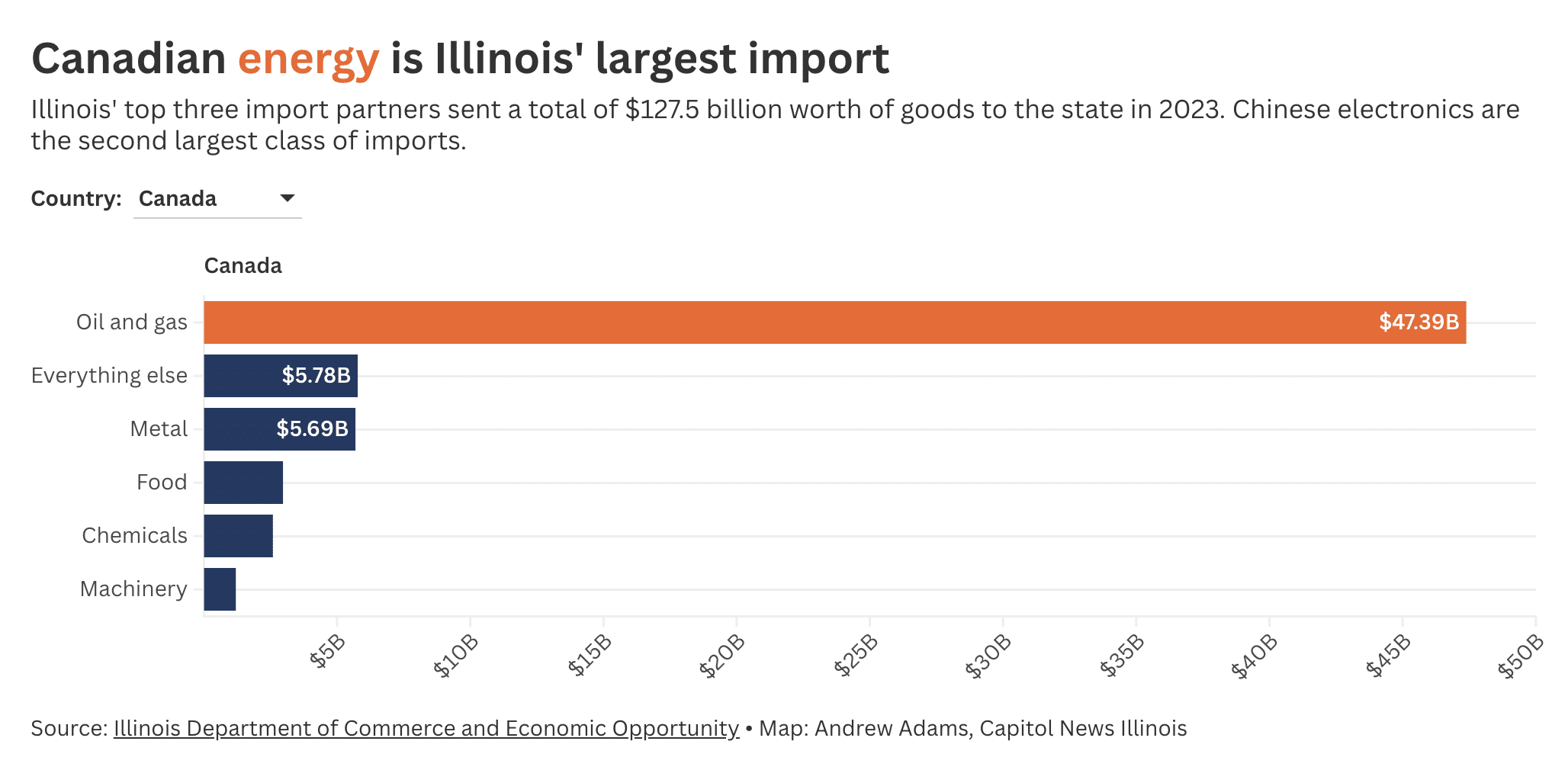Tariffs could impact trade in Illinois

President Donald Trump on Monday agreed to a 30-day pause on his tariff threats against Mexico and Canada as America’s two largest trading partners took steps to appease his concerns about border security and drug trafficking.
The pauses provide a cool-down period after a tumultuous few days that put North America on the cusp of a trade war that could have crushed economic growth, caused prices to soar and ended two of the United States’ most critical partnerships.
Canadian Prime Minister Justin Trudeau said his government would name a fentanyl czar, list Mexican cartels as terrorist groups and launch a “Canada-U.S. Joint Strike Force to combat organized crime, fentanyl and money laundering.”
The White House confirmed the pause, which followed a similar move with Mexico that allows for a period of negotiations about drug smuggling and illegal immigration as well as supplying Mexican troops at the border.
On Saturday, Trump signed orders imposing a 25 percent tariff on imports from Mexico and Canada, as well as a 10 percent levy on goods from China, beginning on Tuesday.
Trump’s plan to implement tariffs on key U.S. trading partners could affect more than $100 billion worth of goods imported to Illinois from Canada, Mexico and China.
The countries were Illinois’ top trading partners in 2023, according to the Illinois Department of Commerce and Economic Opportunity. A wide range of goods coming to Illinois could be affected by tariffs, including oil and natural gas from Canada, beer from Mexico and electronics from China.
A tariff on all goods coming from China remains.
While Trump hopes the tariffs will punish the countries into implementing reforms and negotiating with the U.S., economists generally agree American consumers will bear the costs, including in Illinois.
“Let’s call these tariffs what they are: Trump’s Taxes on Working Families. If these tariffs remain in place, it will jack up the price of groceries and goods, make gas more expensive, and raise utility bills,” Illinois Gov. JB Pritzker said in a statement.
Illinois Republican Party Chair Kathy Salvi defended Trump’s decision.
“Under Democrat leadership, Mexico and Canada have gained economic advantage at America’s expense and President Trump is committed to stopping this. His policies on Canada and Mexico serve as a strong negotiating tool to enhance security and prosperity for Illinois and the United States,” Salvi said in a statement to Capitol News Illinois.
Illinois received $127.8 billion of imports from China, Canada and Mexico in 2023, according to DCEO. Canada is Illinois’ largest partner for both imports and exports, with the state receiving $65.6 billion of goods from the country in 2023.
Illinois is highly dependent on oil and gas from Canada, meaning consumers could be in line for higher energy and gas prices. About 72 percent of Illinois’ imports, or $47.4 billion, from Canada in 2023 was oil and gas, according to DCEO.
Data from the Canadian government shows Illinois also received far more energy products from Canada than any other state in 2020, with $20.5 billion of energy resources imported to Illinois. Texas was the next closest state with $5.2 billion in energy imports.
Canadian paper mills also supply about three-fourths of the newsprint used each year for newspapers, newspaper supplements, certain books and directories and writing paper in the U.S., meaning a tariff would harshly impact that industry.
China was had the second highest number of imports to Illinois in 2023, with $43.9 billion of goods, including $27.2 billion of computers and electronics.
Illinoisans might end up paying more for alcohol and cars if tariffs are implemented on Mexican goods. Illinois received $18.3 billion of imports from Mexico in 2023, including $5.9 billion of beverages and tobacco and $2 billion of transportation equipment.
“Ultimately if Trump’s Taxes on Working Families remain in effect, they would force businesses and supply chains to pass costs onto Illinois consumers,” Pritzker said. “If prices go up and jobs are killed, we must all give credit where credit is due: Donald Trump.”
China, Canada and Mexico received $37.9 billion of exports from Illinois in 2023, nearly half of the state’s exports for the year. This includes a combined $3 billion of agricultural goods to China and Mexico and nearly $4 billion of machinery to Canada.
Canada’s targeted tariffs include penalties on American exports of food and metal products, according to the CBC. Illinois sent $3.2 billion of food and primary metal manufacturing products to Canada in 2023.
Several Canadian premiers lashed out further, ordering their providences’ liquor regulation bodies to stop purchasing and selling alcohol from the U.S.
“Trade is an anchor of the Illinois economy,” Pritzker said. “Illinois is the single largest exporting state in the Midwest and fourth largest exporter in the United States. Our jobs and economic success are linked to our top two trading partners, Canada and Mexico, and also China.”
(Information courtesy of the Associated Press and Capitol News Illinois)






